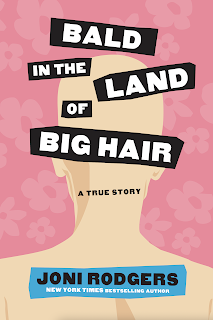The bald girl flashpoint at
Big hair in Texas gives bees beehive envy. It’s prerequisite for a real estate license, a symbol of potent femininity and sensual largess. If people are willing to sit behind you in a movie theater, you’re just not doing it right.
I was 32, a working mom living in Houston, when I was diagnosed with non-Hodgkin’s lymphoma, a potentially lethal blood cancer. A few weeks into the aggressive chemo, I wasn’t just bald, I was salamander. No eyebrows. No eyelashes. No, um…etcetera. I’m not sure I still qualified as a mammal. Even if I could have found a wig that didn’t make me look like Betty Rubble, the summer heat in Houston made wigs, hats, and turbans unbearable.
If I went out with my head uncovered, people called me “sir.” They stared. They snickered. They judged, because it’s human nature to judge first and ask questions later. During a break at my chi gong class one night, I bent down to get a drink from a water fountain, and when I stood up, the young man in line behind me was visibly startled. He glanced down at the floor and then crossed to the other side of the gym to drink from a different water fountain.
For most women, involuntary baldness is a painful experience. This isn’t about vanity; it’s about isolation, separation, and nonsensical cultural bias. My main problem wasn’t the abnormal situation on top of my head; it was the toxic assumptions in the heads of people around me. For me, baldness was the manifestation of the inward exile I’d felt as an awkwardly tall, utterly flat-chested, bisexual girl in a bitchily insular fundamentalist Christian high school. Now my true freak status was out there for all to see. And it was weirdly liberating.
At the moment I was faced with my own mortality, baldness freed me to live in my own skin, finally accepting myself as I am because this is the only self available to me in this lifetime; I can either rock it or die trying to be someone else. I became addicted to the clean, comfortable feeling of baldness, because I liked the feeling of an unabridged me.
My hair grew back after a couple years, but it still gets thin and patchy when I’m sick or stressed, so I’ve buzzed it off many times for practical reasons or just because I felt like it. People used to say how “brave” it was for me to be openly bald. And now they say how “brave” it is for me to not color my gray hair. The subtext of both these backhanded compliments is a reminder that I’m not the woman the world says I’m supposed to be. And I’m cool with that.
It was inexcusable that the show’s producers allowed Smith to remain in the theater. And then presented him with a prestigious award. And then let him blather on about “protecting” his wife, who strikes me as a person who's capable of defending herself. Frankly, his reaction showed how sensitive he is to her baldness, like it’s a handicap or a disease or a “we don’t talk about Bruno” type mortification to the family.
When I was bald, my husband didn’t “protect” me by acting like a jackass or trying to take ownership of my pain. He stood up for me by shaving his own head in solidarity.
If you really want to support a woman who’s bald, respect her for having the courage to be herself. Show her you don’t fear contagion or distrust her sanity. And be grateful, because that beautiful bald head signals how welcome you are to be your own unique self when you’re around her.
Peace and grooviness to all.
jr


